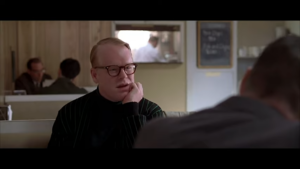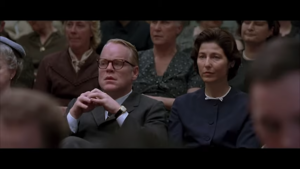Rating: 4.25 out of 5




![]()
I don’t know much about Truman Capote. The only thing I know about is that he wrote Breakfast for Tiffany’s and In Cold Blood. I hear more about Breakfast for Tiffany’s than anything else. I have never seen the movie but heard it is an all-time classic. My question is, how do you go from one extreme with Manhattan and luxury to a freakin murder and getting some grisly details? I don’t know much about the book In Cold Blood, but I learned it was an instant success and is the second-best-selling true crime book in history behind Vincent Bugliosi’s Helter Skelter about the Charles Manson murders.

Directed by Bennett Miller, Capote is a biographical film about American novelist Truman Capote and follows the events during the writing of Capote’s 1965 nonfiction book In Cold Blood. The film starts off with Truman Capote (Hoffman) talking amongst friends about dining with some of Hollywood’s elite. One day, the famed writer reads the New York Times and becomes intrigued about the cold-blooded murders of the Clutter family in their rural Kansas home. Something deep down draws Capote to the murders and a need to write about the events in his next article. Capote travels to Kansas, inviting childhood friend and aspiring writer Nelle Harper Lee (Keener) to come along. Truman hopes to use his celebrity influence to gain access to whoever he needs to write his article. He speaks with various members and lead police investigator Alvin Dewey (Cooper), who was also friends with the Clutter family. When the police arrest and charge two young men, Dick Hickcock (Pellegrino) and Perry Smith (Collins Jr.), for the crimes, Truman uses those same tactics to gain access to them. While talking to the men, Truman’s desire to write soon explodes to him wanting to do what he calls a nonfiction novel. As he starts researching, his personal involvement leads hit to conflicting feelings. As the case drags on, the ending that he wants seems far away but one that will complete one of his masterpieces.
First and foremost, we must talk about the performance of the late and great Philip Seymour Hoffman as Truman Capote. Hoffman seemed to embody the famous writer and show the development that he went through for six years while researching and writing the famous novel. Hoffman needs to be applauded for his performance because he is the movie. His performance is what carries this whole movie and makes it a nice watch. From the speech to mannerisms to facial expressions, Hoffman delivered a performance that delivered him an Academy Award. In the beginning, Hoffman showed Capote as a happy man who dined with the finest people, lived a life that people dreamed of from his book and movie Breakfast at Tiffany’s, and had a loving friend in Harper Lee. Yet, Hoffman showed the turn in Capote as he became more and more intrigued with the murders in Kansas. As the horrors rose from interviewing the men, the more he became depressed, drank, and lose touch with the people closest to him.

Now that is out of the way, let’s talk about the actual movie. Bennett Miller takes a critical period of Capote’s life and how it changed him forever or until his death. The film follows that six-year period where Capote becomes intrigued about a murder in Kanas and begins writing one of his all-time most famous books, In Cold Blood. We see Capote, in the beginning, living the high life, but when he starts talking to the killers, law officers, neighbors of the murdered Clutter family, his project goes from something that piqued his interest to something that deeply touched his very soul.
What changed for Capote during this time is when he gained the trust of one of the killers and seemed to fall in love with the convicted killer. The killer appears quiet, someone you can have a drink with and nothing that resembled any of the horrors that the police stated they committed. This seems to be at the heart that is shown going on inside Capote. He has developed feelings, but he also wants his book to be completed so that people will read it. The ideal best ending is for the killers to die. We see that anything less will cause Capote to lose his very mind. This conflict affects his very relationship with Harper Lee. Capote knows they killed that family and yet, gives the killers money for appeals. After they are hanged, Capote tells Lee that there wasn’t anything he could have done to save them, and Lee sees through that BS with her subtle response by saying, “Maybe, but the fact is you didn’t want to.”
One thing about this film is the atmosphere and cinematography that Miller presents it in. It is a really dark and dreary film. It starts off bright, but it seems like the colors become dull and depressing as the movie goes on. It seems to have a way of showing the mindset and feelings that are going on in Capote. The longer the case drags on, the sadder his emotions. You could sear that no one has any other colors than grey and black. Seemed like most of the scenes were shot in dark lit rooms and made Kansas look sad and depressing. The whole tone of the film added another unique element and dimension to the whole film that made it dreary to watch.

I think the one scene that provided the context of the film was Perry’s confession. In the whole film, he seemed kind and a scared little cat. Some days he wouldn’t eat nor talk while his partner rambled and spoke his mind. He just seemed out of place. Then when his sister wrote that Perry had something evil within him, it made you think that dude is putting up a facade. When he talked about the murders and how they were looking for money only to find like $15 dollars, you think they should just run and never come back, but he says that the dad was nice until he slit his throat. You’re like, this dude is crazy and needs to be hanged.
As far as characters, the one that stands out is Clifton Collins Jr. as Perry Smith. I don’t know why Capote was so drawn to this person. It seems like how people are drawn to serial killers. What is it about them that it’s like drawing a moth to a flame? Is it the gentle look behind them or the bad boy image? Anyway, this is where it seems like the movie focused on, or maybe that is who it’s presented in the book. Maybe Capote spent more time with Smith than anyone else to really know what happened. It felt like Richard “Dick” Hickock, played by Mark Pellegrino, would’ve told it all in the first ten minutes because he also had that slick back hair look to him. Maybe he was less intriguing.
In Cold Blood is one of those films that Capote could’ve told himself but seemed to take a different route. Rather than showing the research and writing the book, it went deeper by showing the complete depression and unraveling of his soul. In the epilogue, it stated that Capote never wrote another book again. You see how much it took out of him and almost what it cost him. Hoffman is excellent in this film. What an outstanding performance.